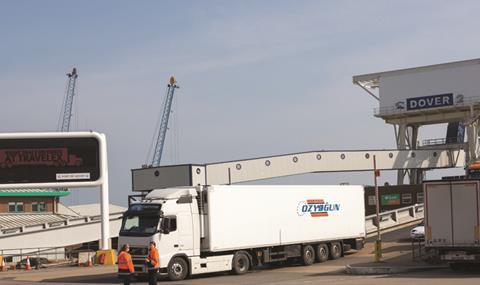
Government plans to evolve the current HGV Road User Levy into a green tax have raised the hackles of the freight industry.
The levy’s original brief, when it was launched in 2014, was to create a level playing field that ensured foreign hauliers travelling on UK roads paid towards their upkeep.
However, the government has begun a review of the levy with the publication of a “call for evidence” paper by the DfT, which appears to move the levy beyond its original brief.
Dubbed Reforming the HGV Road User Levy, the paper outlines plans to introduce time or distance based charges akin to those used in countries such as Germany and Austria.
It states that the reforms are aimed at incentivising hauliers to plan their routes more efficiently and cut their carbon emissions by investing in efficient engines and telematics, as part of the government’s wider air quality agenda.
It points to models such as the German and Austrian motorway distance-based charging schemes and asks for views on how these models “could work in a UK context, for example whether a charge based on the amount of distance travelled by HGVs and by the emissions class of vehicle, could help to meet these objectives, or a differentiated time-based charge”.
It also asks for views on various technologies, including automatic number plate recognition and tag and beacon systems as well as on-board GPS units.
Whilst the paper acknowledges the current levy system has been a success it adds that it has its limitations. It states: “The current Levy is based on weight and number of axles, and it does not vary according to actual use and impact on the road network, nor does it reward operators that adopt best practice in route operation.
"It is therefore timely to consider whether there is more we can do to create a system that is fairer to industry, incentivises more efficient use of our roads and better meets our environmental ambitions.”
Not a revenue raiser
The paper also insists the changes are not intended “to raise more money from hauliers”. It is keen to hear from respondents about how to reduce the administrative burden, suggesting the levy could be integrated with existing UK vehicle charging regimes. These include toll crossings and future regimes, such as clean air zone. It could also function as it does now as part of the Vehicle Excise Duty regime.
However despite these assurances, both the RHA and FTA remain concerned that the proposals will inevitably place additional costs on hauliers.
Christopher Snelling, FTA head of UK policy, believes any move to introduce road charging would add a layer of complexity that would add administrative costs to freight industry.
He told MT: “The levy is complex enough and adding a further layer of complexity will just make it harder for freight operators to remain compliant, particularly the introduction of time or distance based charging which could be difficult to administer.”

He added: “It will make it much more difficult to manage costs in the future, with variable charges on different roads or at different times. How will freight operators plan their costs? And that is all on the assumption that the government keeps it cost neutral. But what guarantee do we have that that will remain the case? They could eventually say the cost has to go up to affect driver behaviour, for example.”
RHA also expressed concern that unless the proposals are entirely cost neutral they will undermine the competitiveness of the UK haulage industry.
Rod McKenzie, RHA director of policy and public affairs, said: “We welcome anything that will improve the quality of roads in this country and while this industry is happy to pay its fair share in taxes, we are against anything that puts extra cost on this already hard pressed industry.
"So whatever the government decides to introduce it must be cost neutral otherwise it will make this industry less competitive than its European counterparts which, in the midst of Brexit, would be an absolute disaster.”
McKenzie also questioned the DfT’s focus on HGVs as a source of congestion and emissions. “Why are they singling out HGVs for this charge?
Freight movement is central to this country’s economic life and lorries do not make non-essential journeys – they don’t have a choice in the journeys they make when the likes of Tesco are waiting for their deliveries - it is cars and vans that cause the most pollution and yet, it is hauliers who are being punished by an unrealistic tax that is not going to reduce congestion,” he said.
Howard Cox, head of campaign group FairFuelUK, believes the move is part of a longer term policy to introduce road charging to all road users.
He told MT: “The government is using HGVs as the guinea pigs – and although we are not against a pay-as-you-go policy, first of all fuel duty has to be removed. We are the most taxed drivers in the world. So it’s all very well pointing to the German road charging model but their diesel is 20% cheaper than the UK’s – and that is a country with a green economy and yet it subsidises its commercial transport because it understands its importance to the economy.
"The UK government needs to wake up and realise it has to get its road and transport policy right first, to get the economy and environment it wants.”
Charging models
Germany:
A distance-based charging scheme which applies to HGVs of 7.5 tonnes and over. Covers the entire motorway network and some other principal roads.
Charge levels between €0.08 and €0.29 per km, dependent on axle configuration and Euro standard.
Users can either enter into a contract with Toll Collect, who provide in-vehicle equipment, or pay manually at motorway service areas.
Uses satellite charging to locate vehicles on charged segment of road.
Austria:
A distance-based charging scheme for HGVs over 3.5 tonnes and covers the entire motorway network. Additional tolls are also in place at certain motorway sections. Charge levels are set between €0.16 and €0.33 per km, dependent on axle configuration and Euro standard and is subject to VAT. An electronic distance-based highway-toll GO-Boxes was introduced in 2004. Payments can be made either in advance or in arrears. A €240 fine is issued with the risk of this being increased to penalties of up to €3000, or the vehicle being confiscated to guarantee payment.
Czech Republic:
A distance-based toll collection. The scheme covers the entire motorway network and some first class roads – 1200km. Initially for HGVs over 12 tonnes but extended to 3.5 tonnes. Scheme is administered by Kapsch, on behalf of Czech Government. Charge based on use of motorway segments. Users require an On Board Unit with a refundable deposit. Pre and post-pay options are available.
Benelux & others:
The scheme covers mainly motorways in Belgium, Denmark, Luxemburg, the Netherlands and Sweden. However, Belgium moved to a distance-based charging system earlier in 2016. The charge is €8 per day. Longer permits (weekly, monthly or annual) vary according to axle numbers and emissions class. Scheme is administered by AGES. Domestic users buy annual permits. Foreign users purchase vignette according to validity required. Prepay only.
Estimated total turnover in 1st year: € 460m (of which foreign: €130m or 29%).













